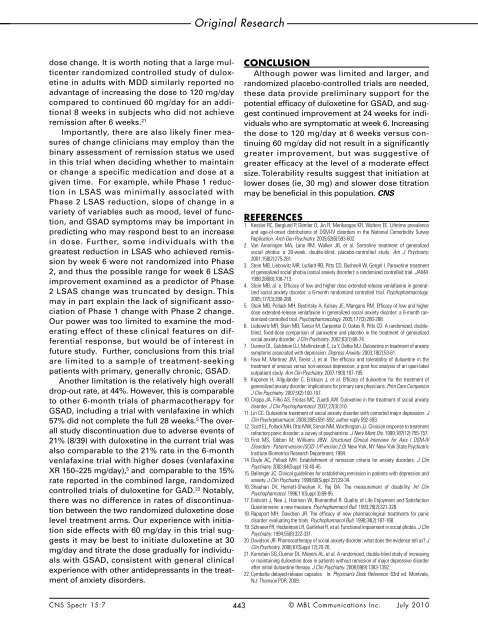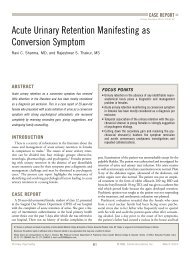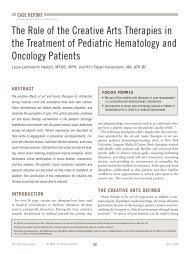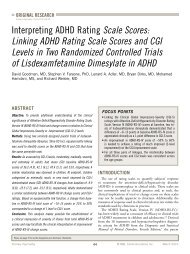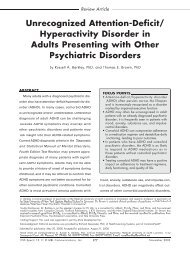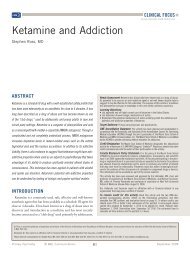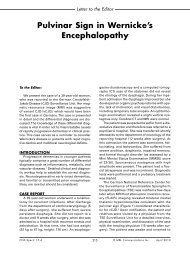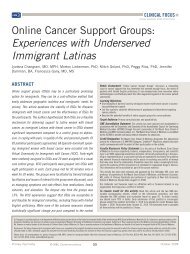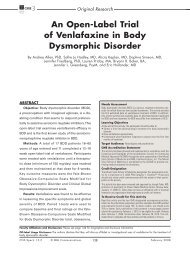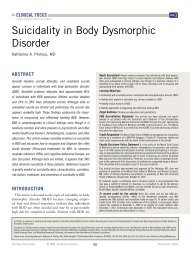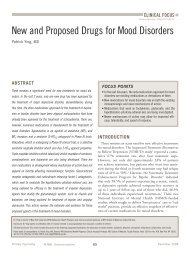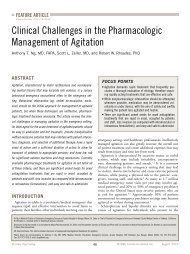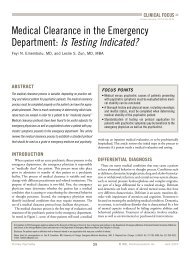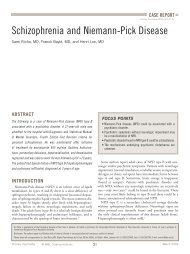Duloxetine For The Treatment Of Generalized Social Anxiety - MBL ...
Duloxetine For The Treatment Of Generalized Social Anxiety - MBL ...
Duloxetine For The Treatment Of Generalized Social Anxiety - MBL ...
Create successful ePaper yourself
Turn your PDF publications into a flip-book with our unique Google optimized e-Paper software.
dose change. It is worth noting that a large multicenter<br />
randomized controlled study of duloxetine<br />
in adults with MDD similarly reported no<br />
advantage of increasing the dose to 120 mg/day<br />
compared to continued 60 mg/day for an additional<br />
8 weeks in subjects who did not achieve<br />
remission after 6 weeks. 21<br />
Importantly, there are also likely finer measures<br />
of change clinicians may employ than the<br />
binary assessment of remission status we used<br />
in this trial when deciding whether to maintain<br />
or change a specific medication and dose at a<br />
given time. <strong>For</strong> example, while Phase 1 reduction<br />
in LSAS was minimally associated with<br />
Phase 2 LSAS reduction, slope of change in a<br />
variety of variables such as mood, level of function,<br />
and GSAD symptoms may be important in<br />
predicting who may respond best to an increase<br />
in dose. Further, some individuals with the<br />
greatest reduction in LSAS who achieved remission<br />
by week 6 were not randomized into Phase<br />
2, and thus the possible range for week 6 LSAS<br />
improvement examined as a predictor of Phase<br />
2 LSAS change was truncated by design. This<br />
may in part explain the lack of significant association<br />
of Phase 1 change with Phase 2 change.<br />
Our power was too limited to examine the moderating<br />
effect of these clinical features on differential<br />
response, but would be of interest in<br />
future study. Further, conclusions from this trial<br />
are limited to a sample of treatment-seeking<br />
patients with primary, generally chronic, GSAD.<br />
Another limitation is the relatively high overall<br />
drop-out rate, at 44%. However, this is comparable<br />
to other 6-month trials of pharmacotherapy for<br />
GSAD, including a trial with venlafaxine in which<br />
57% did not complete the full 28 weeks. 5 <strong>The</strong> overall<br />
study discontinuation due to adverse events of<br />
21% (8/39) with duloxetine in the current trial was<br />
also comparable to the 21% rate in the 6-month<br />
venlafaxine trial with higher doses (venlafaxine<br />
XR 150–225 mg/day), 5 and comparable to the 15%<br />
rate reported in the combined large, randomized<br />
controlled trials of duloxetine for GAD. 22 Notably,<br />
there was no difference in rates of discontinuation<br />
between the two randomized duloxetine dose<br />
level treatment arms. Our experience with initiation<br />
side effects with 60 mg/day in this trial suggests<br />
it may be best to initiate duloxetine at 30<br />
mg/day and titrate the dose gradually for individuals<br />
with GSAD, consistent with general clinical<br />
experience with other antidepressants in the treatment<br />
of anxiety disorders.<br />
Original Research<br />
CONCLUSION<br />
Although power was limited and larger, and<br />
randomized placebo-controlled trials are needed,<br />
these data provide preliminary support for the<br />
potential efficacy of duloxetine for GSAD, and suggest<br />
continued improvement at 24 weeks for individuals<br />
who are symptomatic at week 6. Increasing<br />
the dose to 120 mg/day at 6 weeks versus continuing<br />
60 mg/day did not result in a significantly<br />
greater improvement, but was suggestive of<br />
greater efficacy at the level of a moderate effect<br />
size. Tolerability results suggest that initiation at<br />
lower doses (ie, 30 mg) and slower dose titration<br />
may be beneficial in this population. CNS<br />
REFERENCES<br />
1. Kessler RC, Berglund P, Demler O, Jin R, Merikangas KR, Walters EE. Lifetime prevalence<br />
and age-of-onset distributions of DSM-IV disorders in the National Comorbidity Survey<br />
Replication. Arch Gen Psychiatry. 2005;62(6):593-602.<br />
2. Van Ameringen MA, Lane RM, Walker JR, et al. Sertraline treatment of generalized<br />
social phobia: a 20-week, double-blind, placebo-controlled study. Am J Psychiatry.<br />
2001;158(2):275-281.<br />
3. Stein MB, Liebowitz MR, Lydiard RB, Pitts CD, Bushnell W, Gergel I. Paroxetine treatment<br />
of generalized social phobia (social anxiety disorder): a randomized controlled trial. JAMA.<br />
1998;280(8):708-713.<br />
4. Stein MB, al. e. Efficacy of low and higher dose extended-release venlafaxine in generalized<br />
social anxiety disorder: a 6-month randomized controlled trial. Psychopharmacology.<br />
2005;177(3):280-288.<br />
5. Stein MB, Pollack MH, Bystritsky A, Kelsey JE, Mangano RM. Efficacy of low and higher<br />
dose extended-release venlafaxine in generalized social anxiety disorder: a 6-month randomized<br />
controlled trial. Psychopharmacology. 2005;177(3):280-288.<br />
6. Liebowitz MR, Stein MB, Tancer M, Carpenter D, Oakes R, Pitts CD. A randomized, doubleblind,<br />
fixed-dose comparison of paroxetine and placebo in the treatment of generalized<br />
social anxiety disorder. J Clin Psychiatry. 2002;63(1):66-74.<br />
7. Dunner DL, Goldstein DJ, Mallinckrodt C, Lu Y, Detke MJ. <strong>Duloxetine</strong> in treatment of anxiety<br />
symptoms associated with depression. Depress <strong>Anxiety</strong>. 2003;18(2):53-61.<br />
8. Fava M, Martinez JM, Greist J, et al. <strong>The</strong> efficacy and tolerability of duloxetine in the<br />
treatment of anxious versus non-anxious depression: a post-hoc analysis of an open-label<br />
outpatient study. Ann Clin Psychiatry. 2007;19(3):187-195.<br />
9. Koponen H, Allgulander C, Erickson J, et al. Efficacy of duloxetine for the treatment of<br />
generalized anxiety disorder: implications for primary care physicians. Prim Care Companion<br />
J Clin Psychiatry. 2007;9(2):100-107.<br />
10. Crippa JA, Filho AS, Freitas MC, Zuardi AW. <strong>Duloxetine</strong> in the treatment of social anxiety<br />
disorder. J Clin Psychopharmacol. 2007;27(3):310.<br />
11. Lin CC. <strong>Duloxetine</strong> treatment of social anxiety disorder with comorbid major depression. J<br />
Clin Psychopharmacol. 2008;28(5):591-592; author reply 592-593.<br />
12. Scott EL, Pollack MH, Otto MW, Simon NM, Worthington JJ. Clinician response to treatment<br />
refractory panic disorder: a survey of psychiatrists. J Nerv Ment Dis. 1999;187(12):755-757.<br />
13. First MS, Gibbon M, Williams JBW. Structured Clinical Interview for Axis I DSM-IV<br />
Disorders - Patient version (SCID-1/P version 2.0). New York, NY: New York State Psychiatric<br />
Institute Biometrics Research Department; 1994.<br />
14. Doyle AC, Pollack MH. Establishment of remission criteria for anxiety disorders. J Clin<br />
Psychiatry. 2003;64(Suppl 15):40-45.<br />
15. Ballenger JC. Clinical guidelines for establishing remission in patients with depression and<br />
anxiety. J Clin Psychiatry. 1999;60(Suppl 22):29-34.<br />
16. Sheehan DV, Harnett-Sheehan K, Raj BA. <strong>The</strong> measurement of disability. Int Clin<br />
Psychopharmacol. 1996;11(Suppl 3):89-95.<br />
17. Endicott J, Nee J, Harrison W, Blumenthal R. Quality of Life Enjoyment and Satisfaction<br />
Questionnaire: a new measure. Psychopharmacol Bull. 1993;29(2):321-326.<br />
18. Rapaport MH, Davidson JR. <strong>The</strong> efficacy of new pharmacological treatments for panic<br />
disorder: evaluating the trials. Psychopharmacol Bull. 1998;34(2):167-168.<br />
19. Schneier FR, Heckelman LR, Garfinkel R, et al. Functional impairment in social phobia. J Clin<br />
Psychiatry. 1994;55(8):322-331.<br />
20. Davidson JR. Pharmacotherapy of social anxiety disorder: what does the evidence tell us? J<br />
Clin Psychiatry. 2006;67(Suppl 12):20-26.<br />
21. Kornstein SG, Dunner DL, Meyers AL, et al. A randomized, double-blind study of increasing<br />
or maintaining duloxetine dose in patients without remission of major depressive disorder<br />
after initial duloxetine therapy. J Clin Psychiatry. 2008;69(9):1383-1392.<br />
22. Cymbalta delayed-release capsules. In: Physician’s Desk Reference. 63rd ed. Montvale,<br />
NJ: Thomson PDR; 2009.<br />
CNS Spectr 15:7 443<br />
© <strong>MBL</strong> Communications Inc. July 2010


